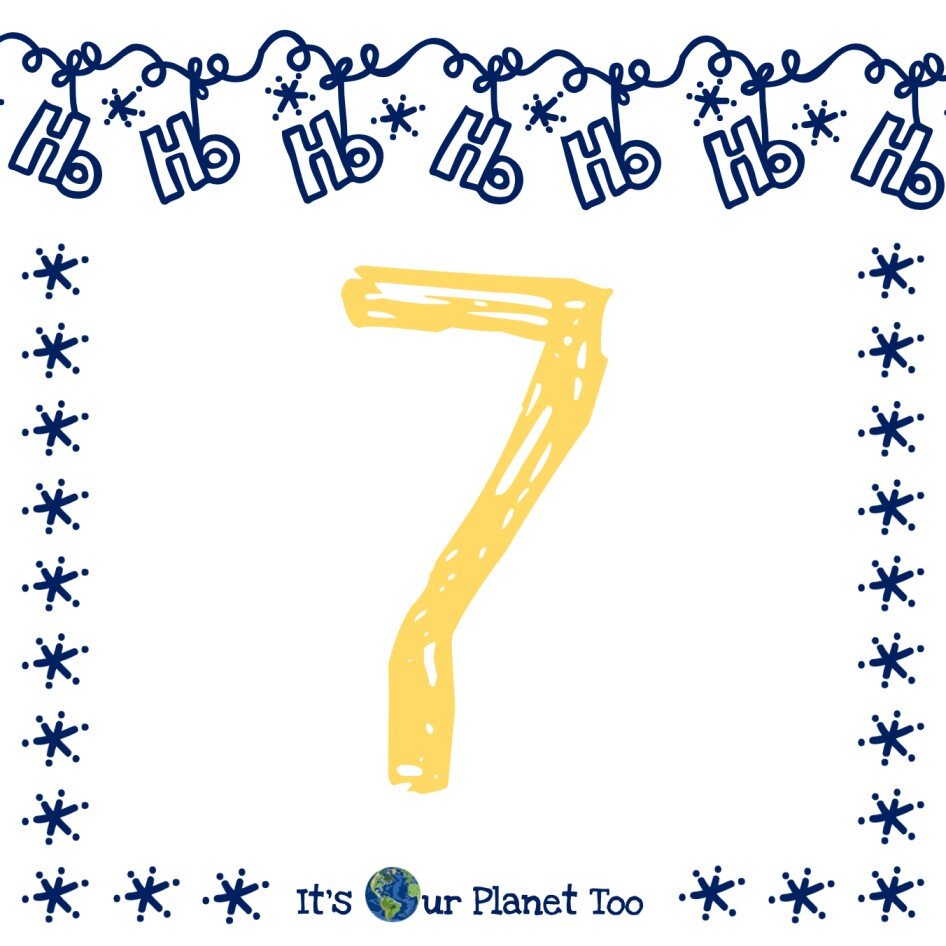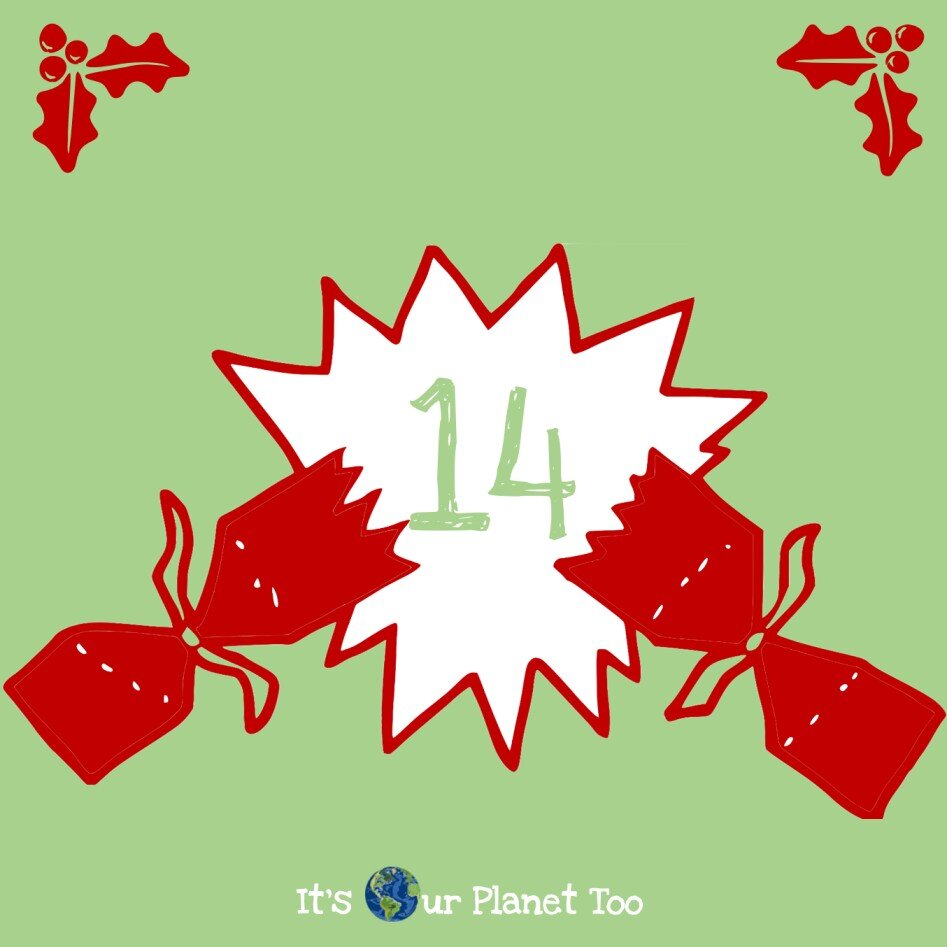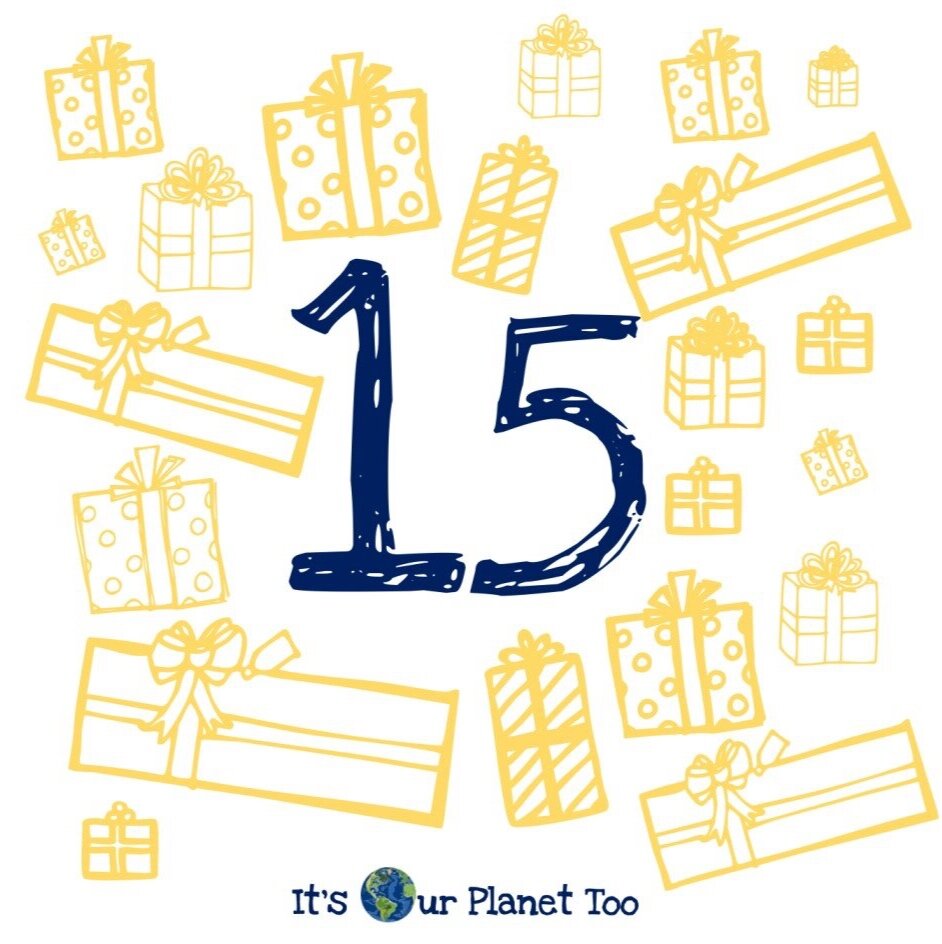24 TIPS FOR AN ECO-FRIENDLY FAMILY CHRISTMAS
The world has become increasingly eco-conscious in recent years, yet Christmas can be a time of consumerism and excess waste.
A 2017 study by The Independent suggested that Brits will bin the equivalent of 108 million rolls of wrapping paper, 54 million plates of food – and use 189 million batteries. More than 40 million rolls of sticky tape will be stuck and almost 100 million black bags full of packaging from toys and gifts will go in the bin. Wow!
By making small changes over the festive season, you can encourage those around you to become more conscious of their environmental impact… by thinking about the food we eat, the paper we use to wrap, the number of batteries we buy or the tree we decorate.
Here is the It’s Our Planet Too eco-advent calendar of 24 top tips of how to reduce your environmental footprint this Christmas – don’t worry you can follow us on Instagram for a little reminder every day in December.
1. Invest in a reusable advent calendar
For many of our kiddies advent calendars signal the start of the festive season and are a big part of the build up to Christmas Day. Being more eco-conscious doesn't mean you have to sacrifice this tradition entirely, but it could mean making a slight change.
Rather than buying a disposable calendar from your local supermarket, why not consider making your own? Or how about purchasing a wooden advent calendar that you can use each year? There are some fabulous products at www.notonthehighstreet.com.
Not only is this a handy way to be kinder to the planet, but it lets you personalise the gifts depending on what takes your fancy; sweeties, hair accessories, pens and pencils, pieces of Lego and what about slipping in a few IOUs (particularly useful when you’ve run out of gifts!)…
2. Send eco-friendly or plantable cards
We’ve just ordered our children’s school Christmas cards… I know in October! Whilst seeing their designs in print is lovely it did strike me as being a little unnecessary.
Research suggests that a quarter of us no longer write Christmas cards, but if you’re keen to continue then there is a way to send seasons greetings without impacting the planet.
Look for cards with the Forest Stewardship Council (FSC) mark. This guarantees the paper has been produced sustainably and ethically. The Woodland Trust shop is a great place to start. Just remember to recycle or compost your cards in January or turn them into decorations for next year.
A zero waste alternative is plantable Christmas cards. When the biodegradable paper is planted in a pot of soil, the seeds will grow and eventually the paper will decompose. Check out Greenwich based company, Eco Friendly Cards for some plantable options!
3. Rent A Christmas tree
Did you know that up to 8 million trees are bought every December in the UK alone… that’s a lot of waste. So what are the options?
Tree rental: More and more places, such as garden centres and plant nurseries, now offer a Christmas-tree hire service over the festive season. They'll often even deliver and collect the tree to save you the hassle. And the tree can carry on growing after it's returned. Sounds like a good solution.
Plant your own: Using or buying a tree with roots lets you grow it outside and use it again next year, reducing its environmental impact and costing you less.
Artificial trees: If you've got a fake tree already, keep using it – make it last as long as possible. But look into more environmentally-sound options when it eventually comes to replacing it. If you’re in the market for a new tree then why now check out eBay, Freecycle or Gumtree for a pre-loved one.
4. Create a homemade wreath
Why buy a wreath for your front door when you can make one from scratch?
Using materials such as a hanger from your wardrobe, foliage from outside, berries and dried orange slices, you can create a wreath that is not only sustainable, but a dazzling display of nature.
Just make sure you get your kiddies outside foraging for those materials.
5. Take reusable bags with you when you go shopping
The use of single-use plastic bags has gone down by 95% since the start of the 5p charge, just remember to bring your own when you’re out shopping for pressies this Christmas.
6. Switch to LED Christmas Lights
Lights are such an important part of Christmas and are used to decorate our trees and our homes. But did you know that if every UK household swapped their regular Christmas lights for an LED equivalent, we could save more than £11 million and 29,000 tonnes of CO2, over the 12 days of Christmas alone.
LEDs are much more environmentally-friendly than traditional twinkling lights, because they use up to 80% less energy. Ninety-five percent of the energy in LEDs is converted into light and only five percent is wasted as heat and whilst the bulbs might be more expensive they should last significantly longer.
7. Rethink your decorations
Some of the best Christmas decorations are family heirlooms that emerge year after year – making them instantly sustainable. However, if you’re looking to add to your collection then look for designs made from brass, glass and wood.
Alternatively get your little ones involved, check out Red Ted Art for some lovely child-friendly ideas
8. Have a crafty Christmas
Getting crafty this Christmas by making your own presents is a great way to involve your kiddies, help the environment and save some money in the process.
Whether you love baking, sewing or painting, this is a great way to put your own stamp on a present. Most grandparents would love some handmade gift of Christmas cookies or a jar of chutney and a card from the little ones.
Still feeling crafty, why not make your own advent calendar or Christmas wreath?
Check out some of the ideas features on Channel 4’s Kirstie’s Handmade Christmas here.
9. Shop locally
Why not give your local shops and markets some love this Christmas. It could save you money, travel, stress and give you the warm glow of knowing that you’re helping a small business. You're also likely to seek out special finds you won't get anywhere else.
Remember to look for locally made gifts or those made from recycled materials as they are likely to have a lower carbon footprint too.
Check out the friends section of our list of fantastic independent businesses owned by parents, there are discount codes too!
10. Choose the right wrapping paper
It is suggested that we use around 227,000 miles of wrapping paper each Christmas – that’s enough to gift wrap the island of Guernsey.
But what many of us don't realise is that gift wrap that contains foil, glitter or plastic can’t be recycled. So before you commit to buying more this year, try the scrunch test… Scrunch up the paper in your hands and then let it go. If the paper stays scrunched up then it can be recycled but, if it unfolds by its own accord, then it likely contains non-recyclable elements.
The good news is that recyclable wrapping paper is becoming easier to get hold of with many high street names now selling recyclable options as well as independents such as Re-wrapped.
It’s Our Planet Too eco advent calendar
11. Make a decoration for the birds
After you’ve decorated your tree, why not get your kiddies involved in making another hanging decoration for the birds?
Hang seed balls and seeds, or peanut strings from a tree in your garden or a nearby green space. To attract a wide variety of birds, use varied seed types. Check out the RSBP website for lots of ideas on how to made bird feeders.
12. Have you thought of re-gifting?
A recent study found that one in nine Brits will swap their presents after Christmas because they received something they didn’t need. Instead of swapping or wasting a gift, why not re-gift?
If you’re taking part in a Secret Santa, re-gifting makes perfect sense as long as you don’t end up offending the original giver!
13. Avoid disposable plastic
If you are serving food for large numbers of people this Christmas (Covid rules allowing) then it might be tempting to buy disposable cutlery or plastic glasses and cups.
An easy alternative is to ask a friend or family member to bring along their plates, cups or cutlery that can be washed and returned to them. If you’re catering for a lot of people then Waitrose & Partners also offer a handy glass loan service.
14. Buy the right crackers
Christmas crackers can be a huge contributor to waste at Christmas – most can not be recycled and the contents tends to end up in the bin pretty quickly!
There are some great eco-friendly alternatives on the market, keep an eye out for recyclable and plastic-free crackers or why not make your own?
Morrisons, the John Lewis Partnership including Waitrose and M&S have taken steps to make their own label Christmas ranges more environmentally friendly by eliminating glitter.
15. Give gifts that will last
When your child has spend weeks flicking through the latest toy catalogue and has written a long wish list it can be incredibly hard to stick to good intentions.
When thinking about the gifts you’re going to buy, consider what kind of presents may be more long-lasting than others. Alternatively, you could buy an experience rather than a material thing for Christmas.
Another great way to cut down on waste and unnecessary gifts is to choose one big present instead. Choosing to gift less presents will help ensure people don't end up with lots of little ones they don't need.
Once you have decided what to buy, it’s always worth checking out the third party certification to determine if a product is environmentally-friendly. Look out for respected eco logos, such as Fairtrade, Rainforest Alliance, Scientific Certification Systems (SCS), Forest Stewardship Council (FSC), Energy Star and Palm Oil Free.
16. Buy food from the right places
Buying the ingredients for your meal from local stores and markets will not only reduce your carbon footprint, but will also help you to show your support for local businesses.
As the Soil Association very succinctly states; “The quality of the food we produce has a profound impact on our own health and the health of the planet, so when it comes to eating meat, our philosophy is to eat a little less meat overall, so that the meat you do buy can be higher welfare.”
17. Give battery-free gifts
Who’s buying electronic toys for their little ones this Christmas? Research suggests that around 40% of all battery sales occur during the festive season.
Discarded batteries are an environmental hazard, they contain toxic chemicals, do not biodegrade and are difficult to recycle.
Have you thought about using rechargeable batteries or even the new USB batteries? Just open the cap and plug them into a USB connector to charge them anywhere.
18. Make Christmas travel greener
Whilst Covid might have thrown a spanner in some of our festive plans, many of us will still be hoping to meet up with family and friends if we can.
If you’re travelling this Christmas then make it a little greener by sharing shopping trips and lifts with friends and family. Remember to use public transport where it’s safe and possible to do so.
19. Reduce your meat consumption
Did you know that the meat and dairy industry is responsible for more emissions than all the world's planes, trains, cars and boats put together!
Whilst the thought of a turkey-free Christmas is unthinkable for some, it might be worth trying to reduce the amount of meat consumed during the festive period.
Perhaps you could try replacing just one meaty meal? According to the Soil Association, food is the single most important, everyday way for people to reduce their own environmental impact.
Check out Red Magazine’s food section for some fantastic meat-free meal ideas.
20. Reduce your food waste
According to The Big Issue approximately 5 million Christmas puddings, 2 million turkeys and 74 million mince pies are thrown away in the UK over the Christmas period.
These quantities are pretty staggering, especially given that nearly 2 million people in the UK are undernourished and more than half a million rely on food parcels.
So what can we do about it? Obviously we can buy less but that’s always tricky if there are guests staying. Another option is to use a food waste app such as Olio to connect you with people in need in your local area. Organisations such as Fare Share, City Harvest and Food Cycle collect surplus food, which is then distributed to those who are in need.
Remember to use your composter for scraps too.
21. Why not gift a charitable donation?
So how many gifts have you forgotten to buy? Rather than rushing out to the shops (again), why not gift a charitable donation
If you need a gift for a child, then the Born Free Foundation offer an adoption scheme that helps provide care and protection for the animal of your choice. The recipient will also receive gift pack, soft toy and bi-annual magazine – the perfect gift for any animal-lover.
Similar schemes are run by the Marine Conservation Society, WWF UK and many other wildlife charities.
22. Think about your outfit
Environmental charity Hubbub suggests that there are 65 million Christmas jumpers stashed away in wardrobes in the UK from previous years. Not only that, up to 95% of them are made using plastic, as the most common fibre used is acrylic.
If your kiddies have grown out of last years outfit, can you swap with family and friends?
When you’re planning party outfits for your little ones (or yourself), try and resist the temptation to splash out on sequins (they’re made from PVC and there are no biodegradable substitutes) and opt for sustainable materials instead.
23. Choose soy candles
Candles are certainly a big part of Christmas and whether you enjoy them as part of advent or simply to make a room feel cosy in the colder months, it's worth thinking about their impact on pollution levels, as well as your health.
Did you know that paraffin candles are made from petroleum residue and are toxic to your health and the environment. Candles made from soy, beeswax or natural vegetable-based wax are more eco-friendly because they biodegrade and are smoke-free. Check out small independent business, Miller and Keane who makes luxury hand-poured candles from 100% plant wax.
24. Get outside and go for a festive walk
Avoid cabin fever, and get some exercise over the Christmas break. It might be winter and it might be Christmas but you can still get outside and show your kiddies how valuable and beautiful nature is and what exactly is at stake when we don't protect it.
The National Trust offers a full calendar of festive activities and events around Christmas, in some of Britain’s most stunning country parks and homes.
Remember to follow us on Instagram for a little eco-advent reminder every day in December.
Happy Christmas Everyone x

























